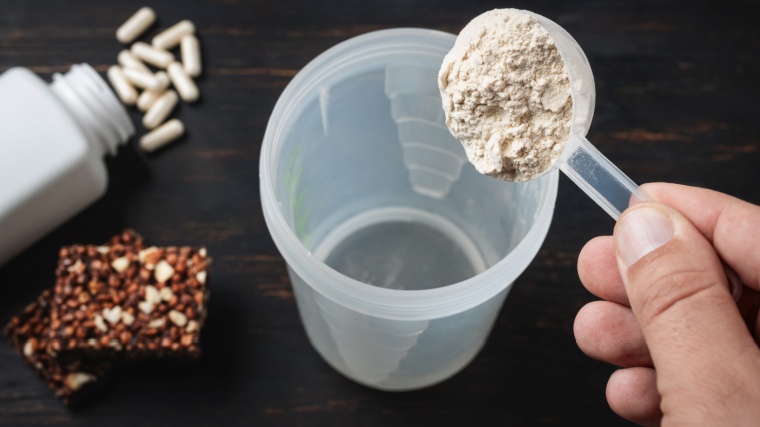It’s deadlift day, and your shaker bottles are ready with pre and post-workout nutrition — pre-workout on the way to the gym and a protein shake to kickstart recovery. You’re fired up and halfway through your warm-up when you feel a tingly, itching sensation on your skin. Don’t panic; it’s a common side-effect of pre-workout, especially if it has beta-alanine in it.

Here, I’ll explain what pre-workout is, what’s in it, what it does, and why it makes you itch. Plus, some quick information on whether or not the itchiness is dangerous and how to treat or avoid it.
What Is Pre-Workout?
Pre-workout products are dietary supplements that contain a blend of ingredients designed to improve exercise performance. Various brands offer different ingredients in their pre-workout formulas, and they come in powder, drink, capsule, or gummy form.
[Read More: Best Natural Pre-Workouts]
The most common ingredients found in the top-selling multi-ingredient pre-workout supplements (MIPS) are beta-alanine, caffeine or other stimulants, citrulline, creatine, taurine, and tyrosine. (1)
Here’s a quick breakdown of each of the top pre-workout ingredients.
- Beta-alanine is an amino acid and precursor to carnosine, which includes histidine. Beta-alanine can increase carnosine levels, which helps stop your muscle cells from filling with lactic acid, potentially delaying muscle fatigue. It can lower your rate of perceived exertion (RPE), letting you train for longer. (2)(3)
- Caffeine (and other stimulants) also delays muscle fatigue while boosting cognition and mental focus. (4)
- L-citurlline, an amino acid, is a precursor to l-arginine, which is needed for nitric oxide synthesis. Nitric oxide is a gas in your body that widens blood vessels and increases blood flow, delivering more oxygen and nutrients to your muscles. (5)
- Creatine is an amino acid that increases your stored energy and allows your body to create and replenish ATP faster. ATP is your energy supply for short-duration, high-intensity exercises like sprinting and weightlifting. (6)
- Taurine is an essential amino acid that works as an antioxidant in your body. It may help reduce oxidative stress during resistance training, helping to increase endurance. (4)
- Tyrosine is a non-essential amino acid that releases neurotransmitters like dopamine and adrenaline. It seems to increase focus and cognition during high-stress situations, which may include resistance training. It may particularly help increase exercise capacity while training in the heat. (7)
What Does Pre-Workout Do?
Pre-workout can affect everyone differently, especially since the ingredients in different formulations can vary. The general idea is to give you a boost of energy and focus in your brain and body that can improve acute exercise performance and enhance training adaptations over time. (4)

[Read More: How to Cook Up Your Own Homemade Pre-Workout]
Pre-workout may improve athletic performance, improve blood flow, increase exercise capacity, delay muscle fatigue, and enhance focus and cognitive function. Creatine can also help build muscle when paired with resistance training and adequate nutrition. (4)
Why Does Beta-Alanine Cause Itching?
Does your pre-workout make you itch? Check if it contains beta-alanine, which is the likely culprit. If you’ve experienced the beta-alanine itch, here’s why.
[Read More: Strongest Pre-Workouts on the Market]
Beta-alanine supplementation is known to cause a few side effects: paresthesia (a tingling sensation) and pruritus (itchy skin). Beta-alanine seems to bind to MrgprD, a G-protein receptor, which causes neurons in your brain to trigger your nervous system to experience a tingly or itchy sensation on your skin. (8)
Is Itchiness From Pre-Workout Dangerous?
While the itchy effects of beta-alanine may be uncomfortable, they are not dangerous. Research states that paresthesia triggered by beta-alanine binding to neuron receptors is not harmful to your health, though it may be uncomfortable and unpleasant. (9)
- The International Society of Sports Nutrition (ISSN) states that beta-alanine supplementation is safe at the recommended dosage for healthy individuals. (2)
- The National Institutes of Health (NIH) states that paresthesia from beta-alanine is not serious or harmful and shouldn’t be painful. (10)
You can always ask a doctor or healthcare professional for personal medical advice if you are concerned that you’re experiencing an allergic reaction. Supplements affect everyone differently based on assigned gender at birth, body weight, age, and other factors.
How to Treat Itchiness From Pre-Workout
Once the itchiness sets in, only time can remove it. Here’s what to do if you feel it and how to avoid it in future sessions.
- Wait It Out: Itchiness is uncomfortable, but how long does it last? It may disappear within one hour, although everyone is different. (11)
- Try Smaller Doses: A standard dosage of beta-alanine can be up to 800 milligrams, which may feel like a high dose for some individuals. Trying a smaller dose may lessen paresthesia and itchiness. (10)
- Divided Dose or Sustained Release: Splitting your beta-alanine dose may help. A sustained-release dose that impacts your system over an extended period may also lessen side effects. (10)
- Don’t Take It Alone: Mixing beta-alanine with a carbohydrate and electrolyte drink may lessen paresthesia. You may want to look for a pre-workout supplement that contains those ingredients or add them in. (10)
Pre-Workout Alternatives to Beta-Alanine
Can’t take the itch? Some people opt for pre-workout supplements without beta-alanine in them to skip it entirely. Since the primary benefit of beta-alanine is reducing fatigue and increasing exercise capacity, you can look for other ingredients that do the same thing.
[Read More: Does Pre-Workout Go Bad? Here’s Everything You Need to Know]
The alternatives won’t be exactly the same since beta-alanine works on increasing muscle carnosine, but they can still improve exercise performance.
- Caffeine or other stimulants are your go-to for an energy boost and less fatigue if you’re okay with a stim pre-workout. Though caffeine shouldn’t cause itchiness, too much of it may cause a jittery feeling. (4)
- Try taking creatine, which also increases exercise capacity, just in a different way. Creatine is one of the most well-researched supplements, and it’s only side effect is temporary bloating. (6)
- Nitric oxide boosters, such as l-citrulline and l-arginine, improve blood flow and increase endurance. Their primary side effect is headaches. (5)
Beta-alanine is an amino acid found in animal-based protein sources, so you can also try adding more of those foods to your diet (if you eat meat) to increase your carnosine levels.
Frequently Asked Questions
Is it bad if pre-workout makes you itchy?
No, the itchiness is uncomfortable but not thought to be dangerous. It’s a common pre-workout side-effect.
Is beta-alanine bad for you?
Beta-alanine is thought to be safe but may affect each individual differently.
Is pre-workout bad for you?
Like all dietary supplements, pre-workouts are not regulated by the FDA. That doesn’t make them bad, but their safety and efficacy are not guaranteed. (12)
How long does pre-workout itchiness last?
It can last 60 to 90 minutes. (10)
What ingredient in pre-workout causes itching?
Beta-alanine causes itching and tingling.
Editor’s Note: The content on BarBend is meant to be informative in nature, but it should not be taken as medical advice. When starting a new training regimen and/or diet, it is always a good idea to consult with a trusted medical professional. We are not a medical resource. The opinions and articles on this site are not intended for use as diagnosis, prevention, and/or treatment of health problems. They are not substitutes for consulting a qualified medical professional.
References
- Jagim AR, Harty PS, Camic CL. Common Ingredient Profiles of Multi-Ingredient Pre-Workout Supplements. Nutrients. 2019 Jan 24;11(2):254.
- Trexler ET, Smith-Ryan AE, Stout JR, Hoffman JR, Wilborn CD, Sale C, Kreider RB, Jäger R, Earnest CP, Bannock L, Campbell B, Kalman D, Ziegenfuss TN, Antonio J. International society of sports nutrition position stand: Beta-Alanine. J Int Soc Sports Nutr. 2015 Jul 15;12:30.
- Murphy MJ, Rushing BR, Sumner SJ, Hackney AC. Dietary Supplements for Athletic Performance in Women: Beta-Alanine, Caffeine, and Nitrate. Int J Sport Nutr Exerc Metab. 2022 Feb 23;32(4):311-323.
- Harty PS, Zabriskie HA, Erickson JL, Molling PE, Kerksick CM, Jagim AR. Multi-ingredient pre-workout supplements, safety implications, and performance outcomes: a brief review. J Int Soc Sports Nutr. 2018 Aug 8;15(1):41.
- Gonzalez AM, Townsend JR, Pinzone AG, Hoffman JR. Supplementation with Nitric Oxide Precursors for Strength Performance: A Review of the Current Literature. Nutrients. 2023 Jan 28;15(3):660.
- Kreider RB, Kalman DS, Antonio J, Ziegenfuss TN, Wildman R, Collins R, Candow DG, Kleiner SM, Almada AL, Lopez HL. International Society of Sports Nutrition position stand: safety and efficacy of creatine supplementation in exercise, sport, and medicine. J Int Soc Sports Nutr. 2017 Jun 13;14:18. doi: 10.1186/s12970-017-0173-z.
- Tumilty L, Davison G, Beckmann M, Thatcher R. Oral tyrosine supplementation improves exercise capacity in the heat. Eur J Appl Physiol. 2011 Dec;111(12):2941-50.
- Liu Q, Sikand P, Ma C, Tang Z, Han L, Li Z, Sun S, LaMotte RH, Dong X. Mechanisms of itch evoked by β-alanine. J Neurosci. 2012 Oct 17;32(42):14532-7.
- Dolan E, Swinton PA, Painelli VS, Stephens Hemingway B, Mazzolani B, Infante Smaira F, Saunders B, Artioli GG, Gualano B. A Systematic Risk Assessment and Meta-Analysis on the Use of Oral β-Alanine Supplementation. Adv Nutr. 2019 May 1;10(3):452-463.
- U.S. Department of Health and Human Services. Dietary Supplements for Exercise and Athletic Performance Fact Sheet for Health Professionals. National Institutes of Health.
- Hoffman, Jay R. PhD, FACSM;; Emerson, Nadia S. BS;; Stout, Jeffrey R. PhD. β-Alanine Supplementation. Current Sports Medicine Reports 11(4):p 189-195, July/August 2012.
- Ronis MJJ, Pedersen KB, Watt J. Adverse Effects of Nutraceuticals and Dietary Supplements. Annu Rev Pharmacol Toxicol. 2018 Jan 6;58:583-601.
Featured Image: MDV Edwards / Shutterstock